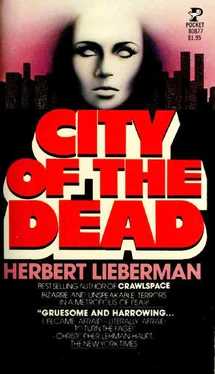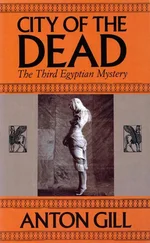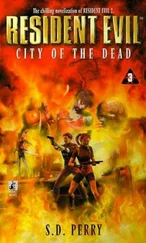He is all alone now in the parking lot, by himself there at the water’s edge, the mist licking his windshield and the foghorns booming and the harbor buoys tolling like poor lost, stricken creatures far out to sea.
Somewhere near 5 a.m. Konig is driving back to Manhattan over the Brooklyn Bridge. The sky is still dark and a pale moon hangs low in the west, just above the jagged skyline of the sleeping city.
The car slides easily now between the tall, mist-hung towers, the tires singing on the slick cobbles. Spent, but curiously exhilarated, Konig drives. He has no way of knowing that only five minutes before, Frank Haggard had passed over that same bridge at a high speed, a crumpled sheet of paper with the scribbled address he’d finally extracted from Klejewski in his pocket, and two patrol cars from the 23rd Precinct winging along behind him.
Going home now to Riverdale is unthinkable. And, as Meacham said, Lolly would not be released until twenty-four hours after the payoff, presumably giving him plenty of time to get far out of the state. The only place Konig could go now, even at 5 a.m. on a Sunday morning, is his office. After all, it is the only refuge, the only solace, he’s known for nearly forty years.
Ten minutes or so up the FDR Drive, exiting at 23rd Street, driving up First Avenue to 30th Street, and he’s there. Parking his car in the private lot in the back, he walks around the building and through the front gate, past the startled, drowsy night man still on duty there.
Shortly he’s at his desk, coffee boiling in a beaker over the Bunsen burner, and a cigar already smoking in the littered ashtray on his desk. He busies himself there, making a concentrated effort to think neither of the night he’s just spent nor of the past five months. Only the future and Lolly and getting “to know each other again.” Isn’t that what the Mayor said? Well, he would make up now for lost time. He would make up for a lot of things.
Whistling softly to himself, he goes about watering his plants, which have been sadly ignored—the poor drooping Dracaenas and the philodendrons, the spider plants and various succulents, looking ragged and parched. Only the glorious wandering Jew flourishes there in the window.
Then, with a sense of relief, he is once again settled at his desk, the good familiar feel of wood and old, cracked leather, the not unpleasant smell of cigar smoke and formalin wafting all about him.
There, on top if everything, lies a large, brown manila envelope with a Fort Bragg imprint. In it he finds the complete medical and dental records of Browder and Ussery. Included with the records and clipped to each are two standard military ID photographs. He leans back in his chair now and studies them.
Browder is precisely as Konig imagined him from his skull conformation—a tough, craggy face with a rather brutal Slavic cast to it. The closely cropped hair, worn GI fashion, and the heavy, prognathic jaw that he’d seen in the skull all tend to heighten the rather brutal mien. But the eyes are not brutal at all; indeed, there’s something even shy and rather vulnerable in them.
Ussery, on the other hand, comes as a complete surprise to him. Even something of a shock. Recalling the hand with the luridly lacquered nails, Konig had naturally expected something fey and effeminate. But what he sees before him now takes his breath away. It is a strikingly beautiful face—small, delicate bones, large, oddly haunted eyes—a kind of male Nefertiti. A rare orchid, exquisite, ephemeral, will-o’-the-wispish. There is, too, something about it unspeakably sad. Perhaps it is the sense of doom that it conveys.
Included is a letter from Colonel McCormick saying that the Army had notified the next of kin. Browder had a wife from whom he was separated. She had already instructed them that the remains were to be sent to her for burial. Ussery’s people, however, were Southern Baptist farmers—pious, hardworking, churchgoing. They were mortified at the scandal and wanted no part of the boy’s remains.
Putting the records aside, Konig is now ready to turn to the stack of unopened mail before him. Letters from clinics, foundations, universities, and hospitals; correspondence from colleagues, old classmates practicing all over the world. Each seeking some favor, petitioning advice, questioning him on aspects of cardiovascular diseases, central nervous system injuries, narcotic deaths, sudden unexplained natural death.
A Chief of Police in Philadelphia wanted ballistics advice in the murder of an old grocer there. A coroner in Cincinnati queried him on a complex toxicological problem. A district attorney in Coos County, New Hampshire, petitioned his services as an expert witness in a crime of passion. A physician in Rangoon, Burma, sought his guidance in establishing a department of forensic medicine at the university there.
Then came the letters of a more personal nature—a grieving mother, a bereft father. These letters, though the details differ widely, are always the same. The same strain of grief and puzzlement runs through them. Written by good, often simple, people who’d been hurt and wanted to know why. Often he couldn’t tell them. The mystery was as deep to him as it was to them. But when he had answers, or solace, he gave them. A woman in Topeka had just lost her infant child as a result of crib death She had read somewhere that he was doing research in the subject and wanted to know why this had happened to her child and if somehow she was responsible. A father in Wilmington thanked him for concluding that the death of his daughter was due to natural causes and not suicide. He and his wife were Catholics, he explained, and the question of suicide was unbearable to them.
“Dear Paul,” wrote an old classmate practicing in Spokane, “Here’s a lulu for you—”
Konig laughs out loud, recalling suddenly a bright, boyish face belonging to a young man who used to sit behind him in Bahnhoff’s pathology lectures.
When he looks up again it is half-past six and the first gray, sooty fingers of dawn streak the sky outside his office windows. He is just about to resume his reading when the phone rings. He sits watching it impassively, as if he’d never seen such a thing before. It rings again, and in the large, empty building, at that hour, it has a ghostly and foreboding sound.
First he’s annoyed, then apprehensive. Who could be calling him there at such an hour? Who would even know he was there? Someone who’d tried to reach him in Riverdale and found him not at home.
The phone rings again, shrill, insistent, echoing through the empty corridors of the building. Reaching for it, he pulls his hand back. It rings once more. Suddenly he’s aware of sweat on his forehead. His body feels clammy beneath his clothing.
Finally he picks up the receiver, but he doesn’t bring it immediately to his ear. Instead he holds it at arm’s length, only a few inches off the cradle, hearing then a man’s voice, very far off, repeating the word “Hello” over and over again.
“Hello,” Konig murmurs hesitantly into the phone.
“Hello.”
A pause follows, portentous and clumsy, in which both parties sit there listening to each other breath.
“Paul, it’s me.”
“Where are you?” Konig snaps, his heart starting to sink.
“Sheepshead Bay,” Haggard says gruffly. “I got Meacham—” Another interminable pause. “But I’m afraid—”
Konig doesn’t actually hear the rest of it but he knows what the detective is saying.
For a long time, it seems, neither man speaks. Konig merely sits there looking at the pile of opened letters on his desk, feeling nothing. It’s as if someone had just spoken to him in some old, lost tongue. It is information he cannot begin to comprehend. Then finally, clearing his throat, he speaks. “When?”
Читать дальше












